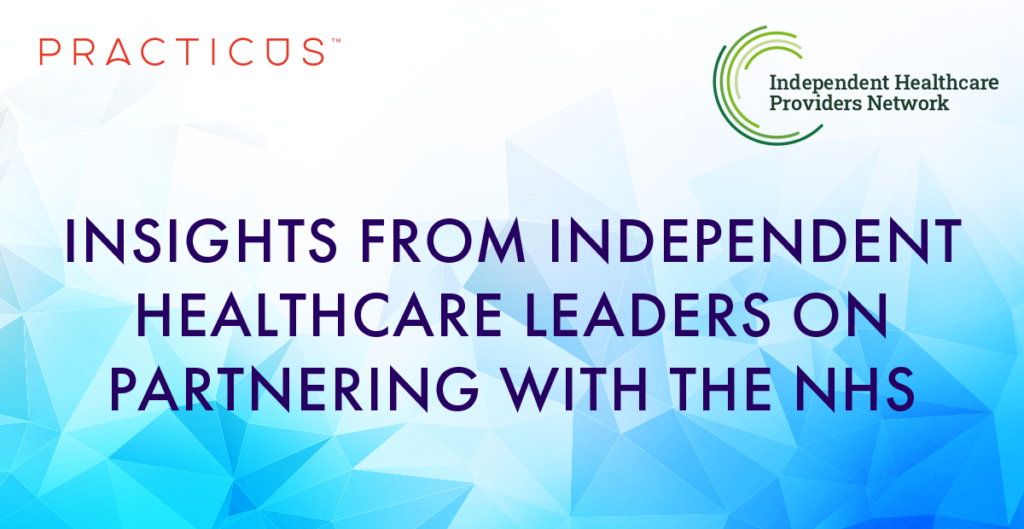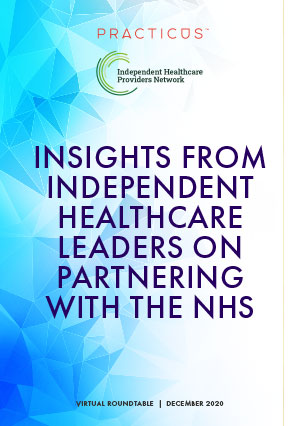INSIGHTS ON PARTNERING WITH THE NHS (INDEPENDENT HEALTH)

Andrew Vaux – Head of Independent Healthcare , Practicus
It was an invitation only ‘virtual’ Roundtable for leaders within Independent Health to explore how as a sector it could work better with the NHS. We partnered with David Hare and Danielle Henry from the Independent Healthcare Providers Network (IHPN) to stage this event because the working relationship with the NHS featured prominently in the list of priorities in the recent IHPN survey (State of the Sector 2020).

Download the full report of the
Roundtable Discussion

Transforming Co-existence into collaboration for the Long Haul
The overwhelming majority of IHPN members felt that the sector’s relationships with both the NHS (at all levels) as well as with Government had strengthened over the Covid-19 crisis, but that serious concerns remained about emerging commissioning structures within the NHS and how providers will be included in new models of care.
So, we brought together a collection of providers (unidentified under Chatham house rules) with representatives from the Nuffield Trust, the IHPN and someone with his feet firmly in the NHS commissioning camp, Giles Mahoney from the Practicus community. Giles is the Executive Director for Surrey Heartlands ICS responsible for Recovery, Specialised Commissioning, Cancer and Stroke Transformation. He was also ICP Director for Guildford and Waverley, one of the four places in the ICS.
At Practicus our purpose is to ‘help people navigate change’ and in 2020, there’s much to navigate. I hope the insights shared below prove useful to you.
Exploring the debate about the mode for future integration and collaboration
We began the discussion by asking whether the sort of integration and collaboration that had happened during Covid that provide a model for the future?
There was immediate acknowledgement from one provider that a focus on patient flow and mobilisation of resources has led to a better dialogue with the NHS. Helen Buckingham, Director of Strategy for the Nuffield Trust, did note that people work differently in a crisis than in normal times, but made the observation that, “people don’t want restoration, they want revolution – they don’t want to go back to what they had before”.
It was recognised that there’s been a shift in the relationship between the NHS and Independent Healthcare and that the challenge for both parties now is to see how they can best understand each other’s needs.
The conversation moved on to ICSs and Helen described the variation across the country using a model of “thin ICS, thick place” and “thick ICS, thin place” and the importance of geography, but felt that “at a provider level, the most important relationships will be in the place”.
ICSs will be very much about being clear on what outcomes they expect to see for their populations and creating the conditions under which providers will work together to deliver those outcomes, but the actual doing and the determining how services are delivered and what the patient pathways are to achieve those outcomes, the expectation is that this will be a conversation that happens much more at place level.
Giles Mahoney agreed about the importance of place and went on to talk about positioning, outlining that ‘setting the scene’ about the role of the private sector in supporting the NHS in its goals, bringing capital, innovation and creativity both within the ICS and local places will be key.
So what has worked since the pandemic struck and what hasn’t
One member talked about experiencing ‘true integration’ on the ground in place, “sharing staff, sharing IT systems, sharing estates, and how the pandemic had definitely fast forwarded a lot of transformation. Her organisation had been asked to provide capability to bring in digital working quickly. She outlined a picture of integration ‘on the ground’ but was concerned that at ICS and National Level, different conversations were being had. “We feel very confused at the moment, we’ve just done a great job during COVID. We’ve done what we thought the NHS wanted, which is integration, we’ve all used our skills differently. But the rhetoric coming from the centre, and from some ICSs is very different.”
The conversation moved onto the political hot potato of why Independent providers can’t lead on services and the mindset that the lead provider always needs to be the NHS. David Hare looked forward to a more ‘nuanced’ and balanced structure where opportunities for the independent sector weren’t missed as a consequence of having a ‘macro lead provider’…so for instance where expertise the independent sector brings in areas like supply chain and logistics can be fully harnessed in a system.
There were a number of areas pointed to where things hadn’t worked well. One member talked about an old school mentality of ‘empire building’ amongst some General Managers in the NHS who are taking an ‘individual’ rather than ‘system’ approach. member concluded, “as we look at ourselves as a whole system during the pandemic, I don’t think we got the balance right about where we were focusing our efforts.”
Another member pointed out that when ‘Command and Control’ rushed to get as many patients out of hospital as possible ahead of the wave, private providers tried to step in to deal with the people falling through the cracks, but were prevented from doing so. This was echoed by another member who’d been disappointed during the recovery phase, to see that empowerment to make quick decisions when the pandemic started, “retrenched to decision by committee”, while patients sit waiting for treatment.
Helen Buckingham from Nuffield pointed to the need for much more to be done to make clearer the contribution of different types of independent providers. Her colleague, Senior Fellow Sarah Reed, made an interesting international comparison, “a lot of the challenges and tensions that we’ve talked about here are things we are also seeing internationally, regardless of how different the contexts are. In countries that have robust private and public sectors, COVID is changing those relationships, and some systems are having to think differently about how they work with and partner with independent providers.” Even health systems that entered the pandemic with greater capacity than the NHS are experiencing backlogs as they catch up on routine services cancelled or deferred during the first wave of the pandemic.
So what relationships should independent providers prioritise? GPs, CCGs, Trusts, Local Authorities?
One member pointed out that his organisation had already shifted its focus away from the CCG and onto the Trust and outlined that the integration level with the Trust is much higher. Another described how the system over recent years has become more “fragmented…you have to be really tuned in to the local area and its motivators, who are the real power players and who you need to talk to?”
It was concluded that this was to be expected given there are 44 ICSs across the country and they’re not uniform. One member pointed to a lack of understanding between the ICS and the Local Authority, “they speak different languages”. She advocated building relationships with both entities. “It’s only by building those relationships that we’re going to solve the problems of the Acute hospitals. Otherwise they’ll continue to be full of the frail and elderly when the third and fourth wave hits. This will continue to happen until we solve that integration”.
Another member outlined that the lack of understanding was compounded by who was in control of the pot of money and protected interests. “Until we can break down the barriers between healthcare and local authorities, we’re not going to get full integration and that’s within the control of government. They need to take people’s focus away from protecting their pot and realise that there’s a bigger prize to be had, the health of the nation.”
Advice was shared not to focus too much on building a relationship with one side and not the other, building with both will help you create solutions that work for both.
What support is needed from policy makers to ensure/encourage integration in the right way?
Giles Mahoney talked of a big financial headache hitting the NHS over the next two years and the need for policy makers, “to encourage a benign relationship of integration with the independent sector because there isn’t going to be the amount of money in the public sector (the local authorities and the NHS) to support the agenda we all have to move to population health management”.
Giles’s optimism for stronger relationships was supported by David Hare who saw a future “dearth of capital” in the NHS as the catalyst for the independent sector to bring in both investment and experience of efficiency. But he warned there would be a need for the independent sector to be “robust but unthreatening” to ensure the “natural antibodies” that exist in local systems to the independent sector, don’t just push this support away.
It was pointed out that it matters who makes the policy and that since 2012, the government has effectively outsourced policy to NHSE. “That has made it difficult for there to be a predictable consistent policy regime in which independent sector providers can positively engage within…who would you talk to about capital at the moment?” This speaker believed that if you want the stable policy landscape required for long term investment from the independent sector, policy needs to come not from the NHS itself, but the architecture in which it operates.
One member outlined that Independent Health needs to push partnership working and bring innovation into that rather than being seen as, “the rescue people who come in at the last minute and go away when the problem is solved.”
I thought David Hare made a really interesting observation when he talked of a public perception that Independent Healthcare has stepped up in an emergency and done the right thing. “Wouldn’t it be sad if in 12 months’ time the old divide between public and private had been re-established…you can talk about laws and policies, but ultimately it comes down to culture and the fact it’s a bit of Mars and Venus.” This he said could be overcome by designing a set of practical “micro-policies”, like enabling graduate trainees to do secondments in the independent sector and the voluntary sector, so they see a single rather than divided healthcare system.
As someone who has supported hundreds of change agendas in the independent healthcare sector for more than a decade, what’s so obvious from all of the clients and community members that I talk to day in day out, is their commitment to play their part in the future of healthcare. I’ve heard all of the scare stories, read all of the disparaging and negative PR, but I don’t see this sector driven by ‘grubby opportunism’ as some would have it. Those voices should be much less audible having seen the key role independent health has played during the pandemic. The sector can and should be proud of the role it’s played and continues to play. The definition and details of what that role becomes as we shape the future of healthcare in the UK will evolve as new structures and relationships form. But surely the scene is now set for a more mature and integrated inclusion of independent health as we look to a post Covid world.
